Environment & Climate Change
YMCA Cuttack Observed “World Malaria Day” with Y’s Men International
Last Updated (Wednesday, 30 April 2025 18:46)
YMCA Cuttack Observed “World Malaria Day” with Y’s Men International
YMCA Cuttack and Y’s Men International observed World Malaria Day on 25th April, 2025, from 6:00 AM onwards at YMCA Cuttack. A Human Chain Program was conducted and inaugurated the Roll Back Malaria Project. The Chief Guest for the occasion was Hon’ble Justice A. S. Naidu while the Guests of Honour were Ym. T. K. Jaykumar, International Chairman, Roll Back Malaria, Y’s Men International, Dr. Prasanta Kumar Hota, PGDPHM, CDMO, Cuttack and Mr. Pramod Kumar Mohapatra, Former Editor of the Samaja and Environmentalist.
The Chief Guest, Guests of Honour, dignitaries, esteemed guests, school students and their parents/guardians, members of various Y’s Men clubs of NENEIR and the Board of Directors of YMCA Cuttack participated in the human chain program by forming a human chain starting from YMCA Cuttack towards the CDMO Office at the Old Secretariat Road, Buxi Bazar, Cuttack, holding banners and placards on the theme “Roll Back Malaria” to create awareness on the World Malaria Day.
The inauguration ceremony of the Roll Back Malaria Project received the welcome address by Ym. Adv. Prasanna Kumar Nanda, Y’s Men International, NENEIR while the vote of thanks was offered by Dr. Raj Bolobha Mohanty, President, YMCA Cuttack and Regional Chairman of the Eastern India Region of YMCAs. The Chief Guest and Guests of Honour distributed the prizes for the Art, Essay and Placard making competitions during the program. Around 120 beneficiaries attended the program.
Er. Alok Kumar Sahu, Secretary, In-charge O/o General Secretary, YMCA Cuttack
 |  |
 | 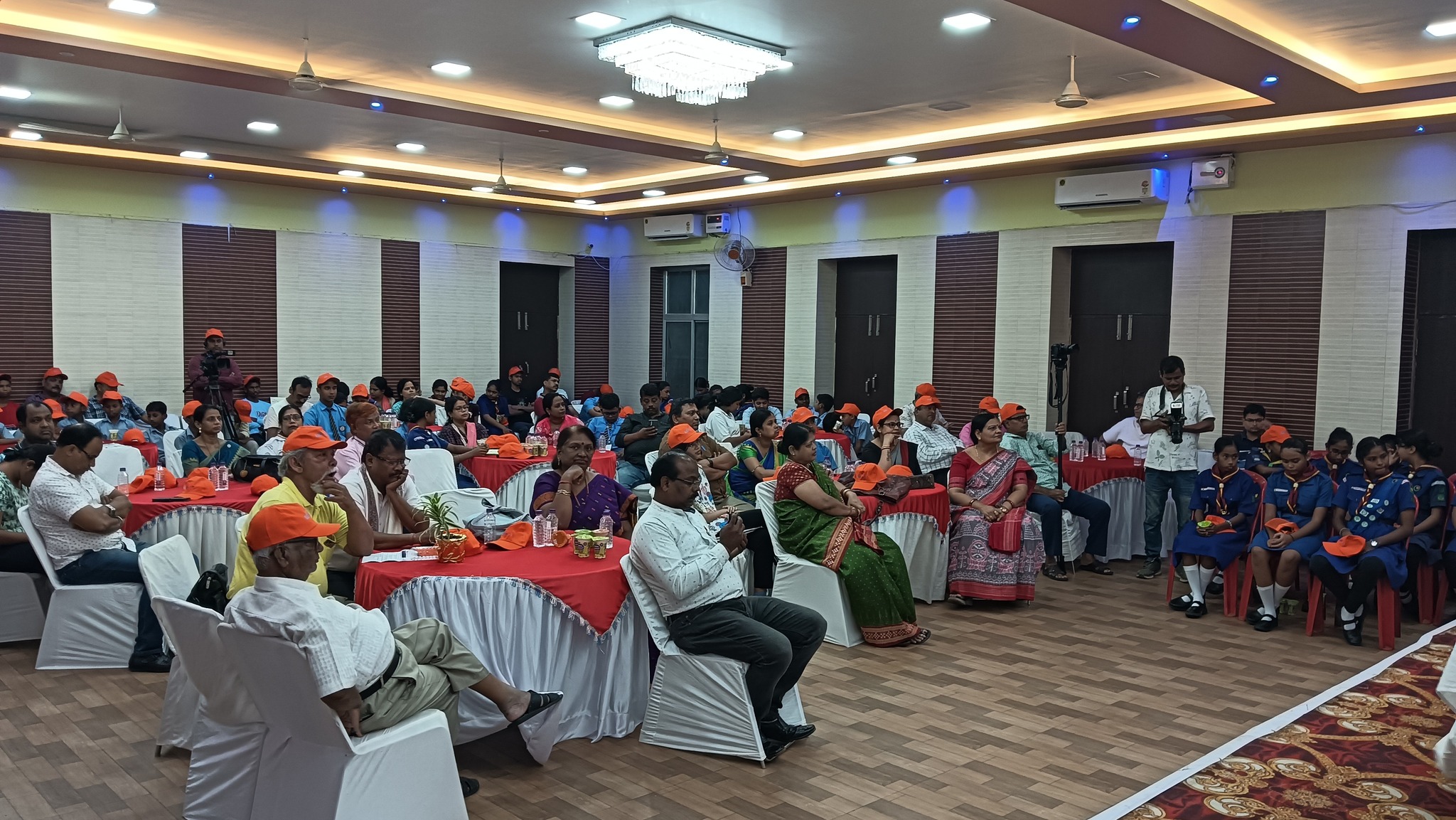 |
 | 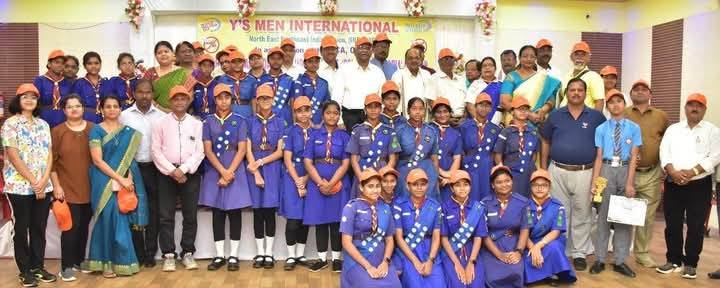 |
From Earth Hour to Earth Day- Climate Action Campaign 2025
Last Updated (Wednesday, 02 April 2025 07:17)
To: All Climate Activists
Asia and Pacific Alliance of YMCAs launched a 31-Day Climate Action Challenge beginning with Earth Hour 22 March and continue with a daily climate action challenge till Earth Day on 22 April. The main objective for this sustained campaign is to raise awareness on global warming and how we as individuals can commit and contribute towards averting this climate crisis through our small personal acts of mitigation and adaptation on climate change. It is also our hope that these daily challenges will provide creative as well as challenging ideas on how our personal actions and habits can help to save our mother earth. We hope that the sustained 31-day challenge can spark lasting changes towards a responsible low-carbon lifestyle. Be a Climate Defender and let us join our efforts together to make significant contributions towards the goal of capping global warming at 1.5C above the preindustrial levels.
The climate action challenges follow the following themes:
1. Vegetarian-Vegan - Monday
2. No-plastic - Tuesday
3. Low carbon - Wednesday
4. Low water - Thursday
5. Zer0 waste - Friday
6. Recycle & Upcycle - Saturday
7. Buy local - Sunday
Please register to let us know of your support: https://forms.gle/fhvtEVsLTQ6p82pa6
Click the links below for your weekly climate action challenges
Week-1 - https://drive.google.com/file/d/1-5tMZ2aLai9y5wxi8MTZX8MFR8RL8GFF/view?usp=sharing
Week-2 - https://drive.google.com/file/d/1-DPJHbIs-KcYw-XmVh8mESoecY7ic9sP/view?usp=sharing
Week-3 - https://drive.google.com/file/d/1-CI2Queaf5ncfep_bYFmHfipZuzmcGZy/view?usp=sharing
Week-4 - https://drive.google.com/file/d/1-CFv98m2hbuJXlY1bp4QpCmgiMYkHisU/view?usp=sharing
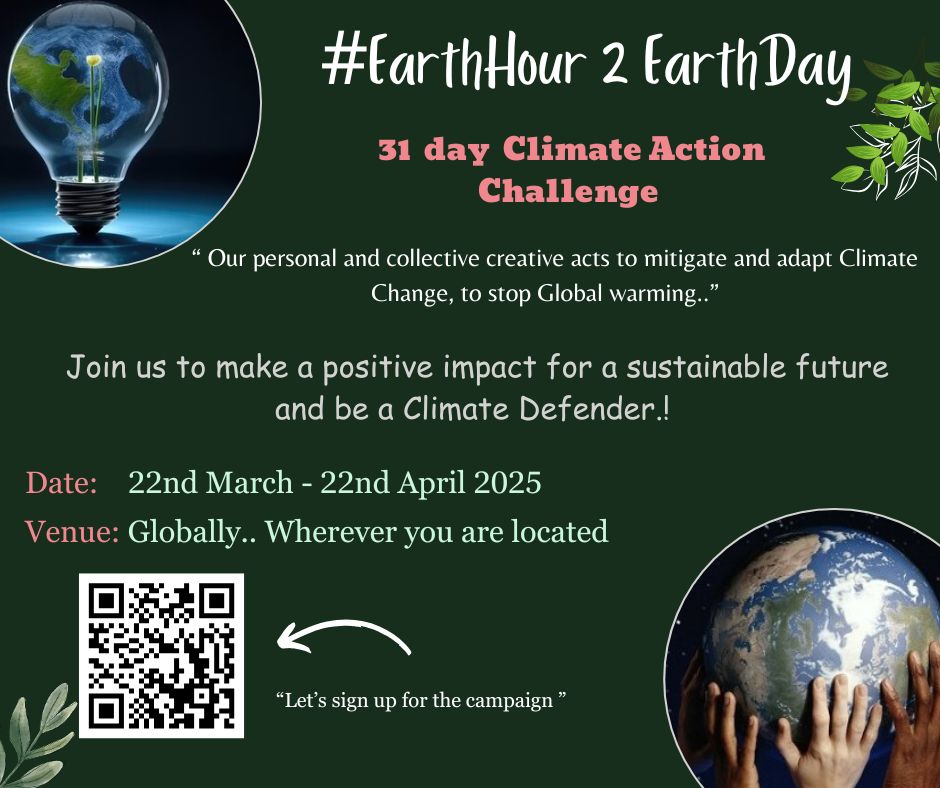
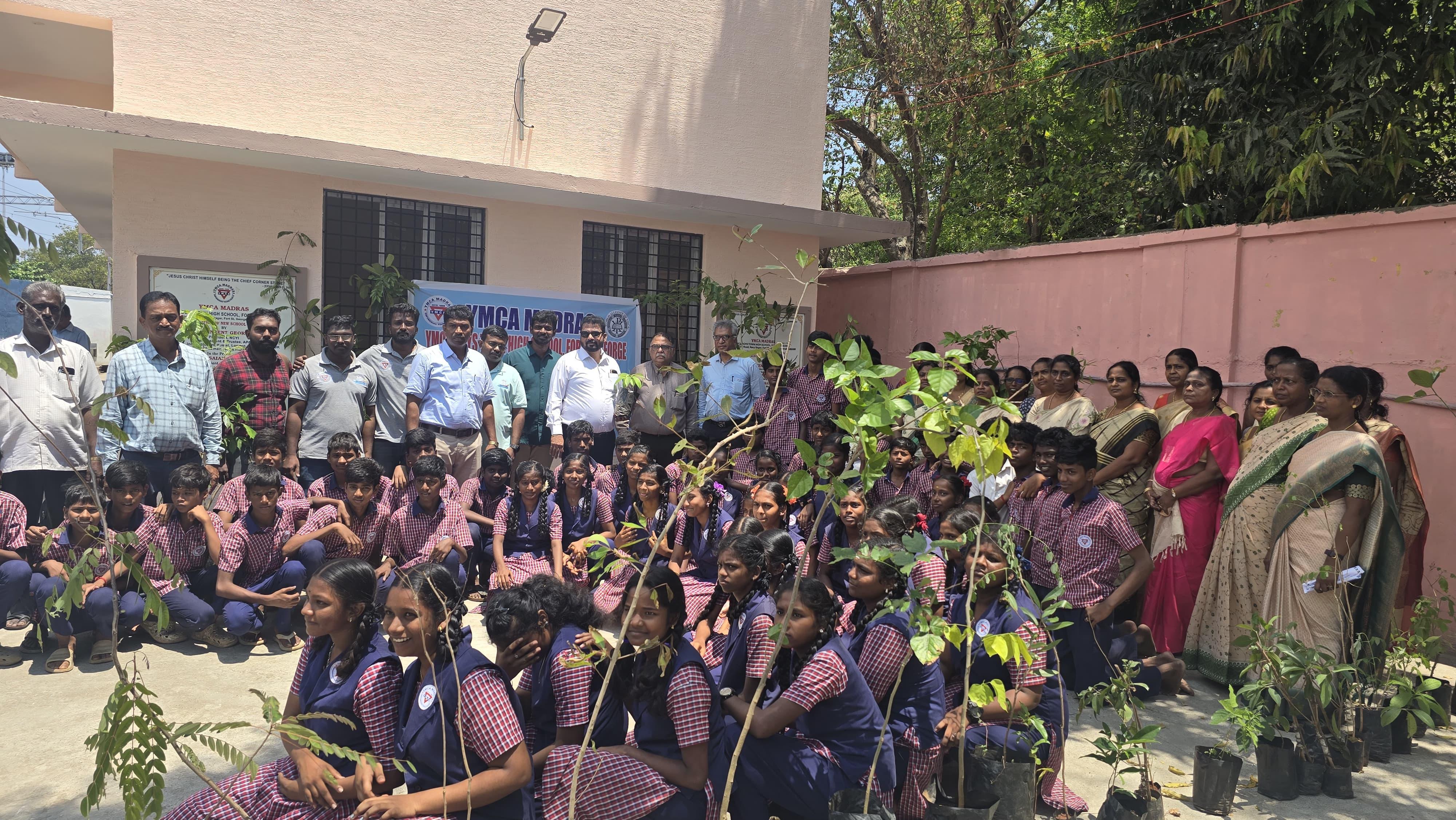
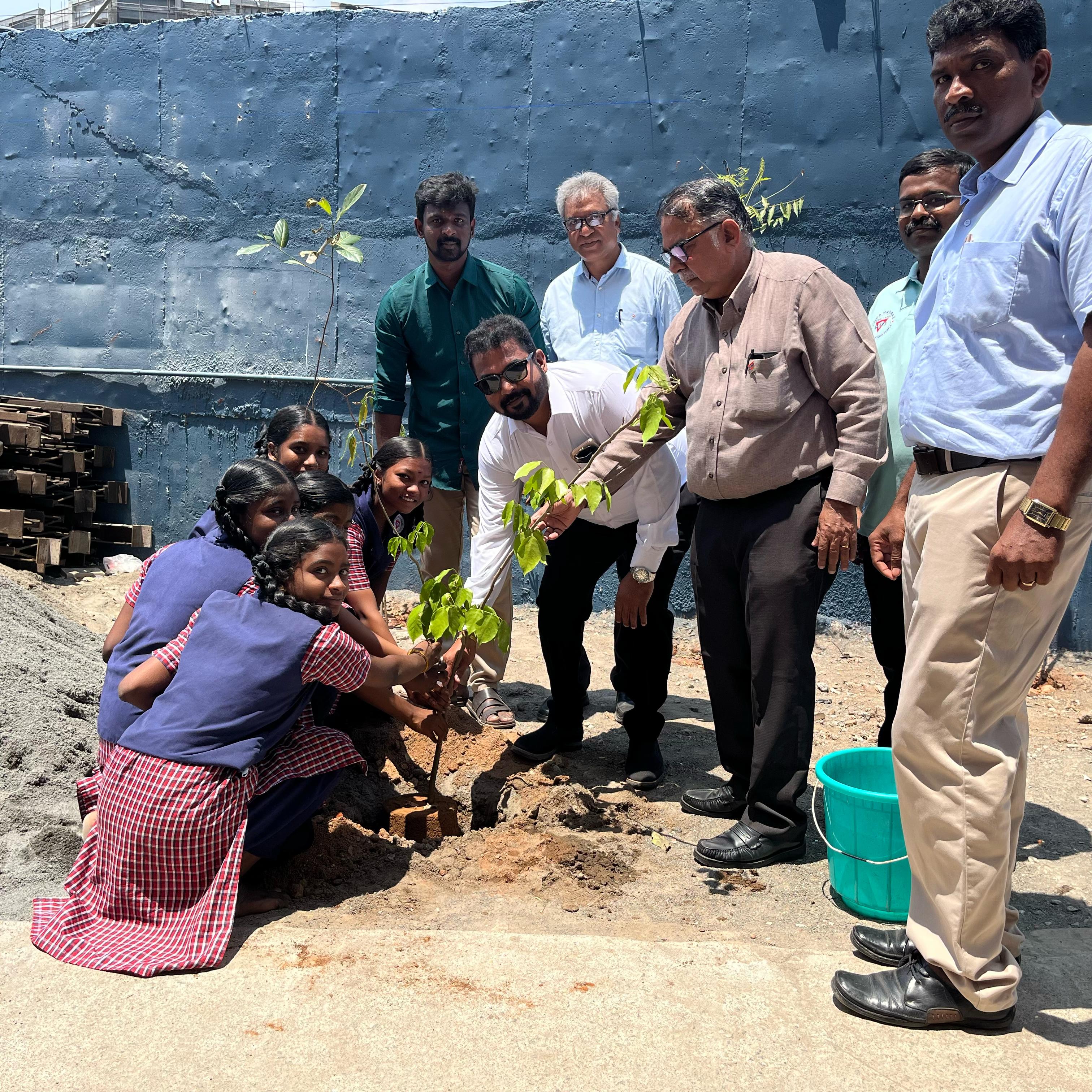 | 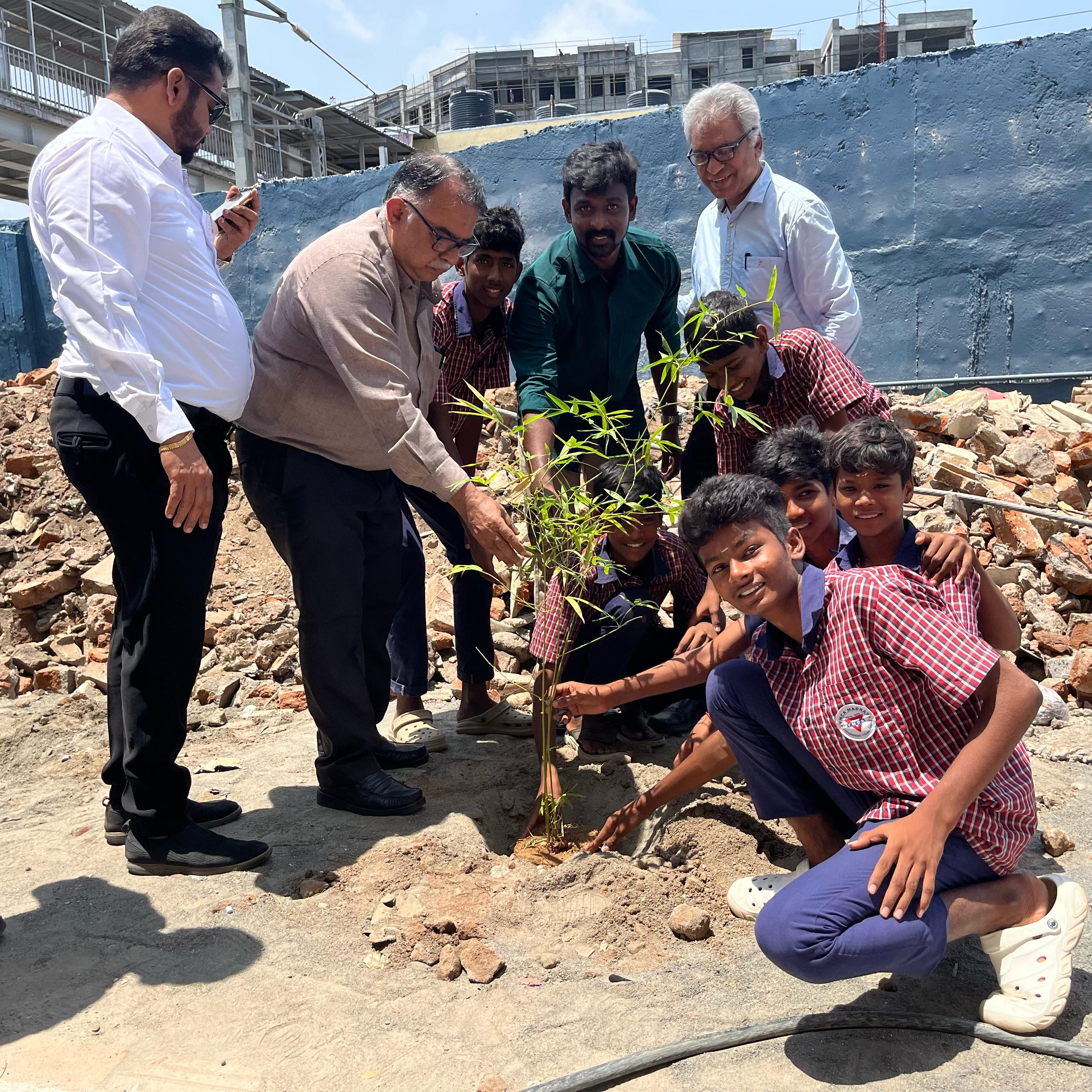 |
“From Earth Hour to Earth Day”- Climate Action Campaign 2025
Last Updated (Friday, 07 February 2025 08:52)
Join us to take meaningful action for our planet!
We are excited to announce the commencement of this year's #EarthHour2EarthDay 31-day climate action challenge, aimed at creating a positive impact on our planet. This initiative is part of the Climate Defenders project. The campaign will run from March 22nd to April 22nd, 2025. During this time, we will embark on a journey to promote sustainability, reduce our carbon footprint, and safeguard the environment.
Our main objective is to increase awareness about global warming and how each of us can commit to and contribute to preventing this climate crisis through our small personal actions for mitigation and adaptation to climate change.
As part of this campaign, we encourage you to participate either individually or with your friends by sharing best practices to help us achieve our objective. To make a significant impact on the community, we invite you to create and share your creative videos or posts about our daily challenge on social media, tagging us in your posts.
Themes of our challenges:
1. Vegetarian-Vegan Monday
2. No-plastic Tuesday
3. Low carbon Wednesday
4. Low water Thursday
5. Zero waste Friday
6. Recycle & Upcycle Saturday
7. Buy local Sunday
Stay tuned for more information and the daily challenges to make a difference!
To make this campaign more meaningful, use these campaign hashtags;
#EarthHour2EarthDay #YMCA_ClimateDefenders #Change4Climate
Your efficient contribution is expected from the beginning to the end.
By working together, we can create a significant impact and contribute to a healthier planet for future generations!

APAY E-Learning Registration is Open
Last Updated (Wednesday, 18 December 2024 17:21)
APAY E-Learning
We are excited to announce that registration for our APAY E-Learning program is now open for new youth groups!
This easily accessible online platform will help participants gain knowledge from well-known universities. By the end of this 4-month course, participants will receive a certificate of completion, recognizing their dedication and achievements.
Join us to explore:
- Doing Economics: Measuring Climate Change
- Global Warming: The Science and Modelling of Climate Change
- The Sustainability Imperative
And there's more!
Our platform is open for registration from 18th December 2024 to 15th January 2025. The registration process is quick and simple, taking just a few minutes. Click the link to sign up!
[Registration link: https://forms.gle/ymt2RmUFkwgbesgh9]
Embark on your learning journey today!

Pakistan Alums holds a Three-Day Workshop on Climate Change
Last Updated (Wednesday, 18 December 2024 17:25)
A three-day workshop on Ecological Crisis and Climate Change Issues in Pakistan was held at the YMCA Hall in Lahore, Pakistan, from 15 to 17 November 2024. The event was organized by YMCA Lahore in collaboration with the alumni of the Interfaith Cooperation Forum (ICF), a project of the Asia Pacific Alliance of YMCAs. The workshop brought together individuals from various backgrounds, including College and University students, environmental activists, and community leaders. The workshop commenced with an introductory session that outlined the objectives and importance of addressing climate change.
The event brought together youth from some parts of the country, especially from different cities and rural areas. There were 10 participants: five males and five females. Seven out of 10 participants were Christians, one was a Muslim, and two were Hindus. This event highlighted for the youth the importance of Climate Change issues that Pakistani communities and surroundings face. The workshop challenged the participants to think of how they could make an impact through their efforts as citizens of the country and take small steps in spreading awareness of Climate Change reduction.
On Day 1, Ms. Sania Ashiq, Assistant Secretary of Lahore YMCA, discussed the Major Ecological Crisis and Root Causes of the Ecological Crisis. The Youth Coordinator, Mr. Ramis John, discussed the conflict Analysis Tools, focusing on the Conflict Tree. The participants were grouped to work as teams, discuss the topics, and share their experiences and ideas.
The resource persons also highlighted the increasing phenomenon of smog and its impact on the lives of the people in Pakistan. In this workshop, the participants also learned some steps in reducing smog and spreading awareness among their communities about smog reduction.
Lahore City, Pakistan, is the most badly affected city in the world by air pollution and smog. According to Global Air Pollution Rankings in 2024, Pakistan consistently ranks high among the worst cities in the world for its air quality, though it is second only to Bangladesh. Burning fossil fuels for transportation, heating fuel, waste incineration, electricity generation, and other industrial activities are responsible for increasing levels of air pollution. Due to this smog and air pollution, school children and older citizens are the most affected, creating many health issues and respiratory problems among the people and communities.
On Day 2, Mr. Ramis John discussed the Introduction to Climate Change, and Ms. Sania Ashiq gave input on Understanding the Climate Change issues and their solutions. This was followed by the presentation of the General Secretary of Lahore YMCA, Emanuel Sarfraz, on the Challenges and Effects of Climate Change on our community and environment. The attendees also participated in the group activity of making an Awareness campaign for the reduction of climate change.
International guests from different countries joined online for this workshop through Zoom meetings to interact with and share their experiences on climate change. Ms. Baidido Saganding, Program Officer of ICF, and Mr. Nam Boo Won, APAY General Secretary, joined from Korea. Ms. Santoshi Wagle of Nepal and Mr. Probin Tripura of Bangladesh also joined the online part of the workshop.
The Lahore YMCA conducted a clean and green environment activity with the workshop participants on Day Three. The participants learned through this practical activity of growing trees and taking care of them. They also cleaned the streets to promote a green, healthy environment for all. This activity aims to teach the youth to understand their responsibility as a citizen to make our environment clean.
A video documentary of the activities was produced to share the participants’ learning and knowledge on Ecological crisis and Climate change issues. The workshop ended with the distribution of Certificates of Attendance to the participants by Mr. Asghar Suleman, President of Lahore YMCA, Mr. John William, Director of Lahore YMCA, and Mr. Emanuel Sarfraz, General Secretary of Pakistan YMCA.
Ramis John
ICF Alumnus and Youth Coordinator of Lahore YMCA
Pakistan
 |  |
 |  |
Read more...
Page 2 of 17





